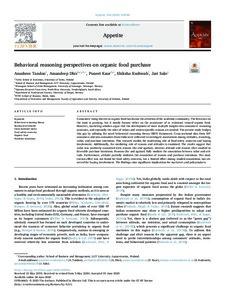Behavioral reasoning perspectives on organic food purchase
AnushreeTandon; Amandeep Dhir; Puneet Kaur; Shiksha Kushwah; Jari Salo
Behavioral reasoning perspectives on organic food purchase
AnushreeTandon
Amandeep Dhir
Puneet Kaur
Shiksha Kushwah
Jari Salo
Elsevier
Julkaisun pysyvä osoite on:
https://urn.fi/URN:NBN:fi-fe2021042820875
https://urn.fi/URN:NBN:fi-fe2021042820875
Tiivistelmä
Consumers' rising interest in organic food has drawn the attention of the academic community. The literature on the topic is growing, but it mostly focuses either on the acceptance of or resistance toward organic food. However, marketing scholars argue that the development of more in-depth insights into consumers' reasoning processes, and especially the roles of values and context-specific reasons are needed. The present study bridges this gap by utilizing the novel behavioral reasoning theory (BRT) framework. Cross-sectional data from 307 consumers and non-consumers from India were collected to investigate associations among attitudes, reasoning, value, and purchase intentions. This research studies the moderating role of food safety concerns and buying involvement. Additionally, the mediating role of reasons and attitudes is examined. The results suggest that value was positively associated with reasons (for and against), whereas attitude and reasons (for) resulted in favorable purchase intentions. Reasons (for and against) fully mediate the association between value and attitude. Furthermore, attitude partially mediates the association of reasons and purchase intentions. The moderation effect was not found for food safety concerns, but a limited effect among studied associations was observed for buying involvement. The findings raise significant implications for marketers and policymakers.
Kokoelmat
- Rinnakkaistallenteet [27093]
